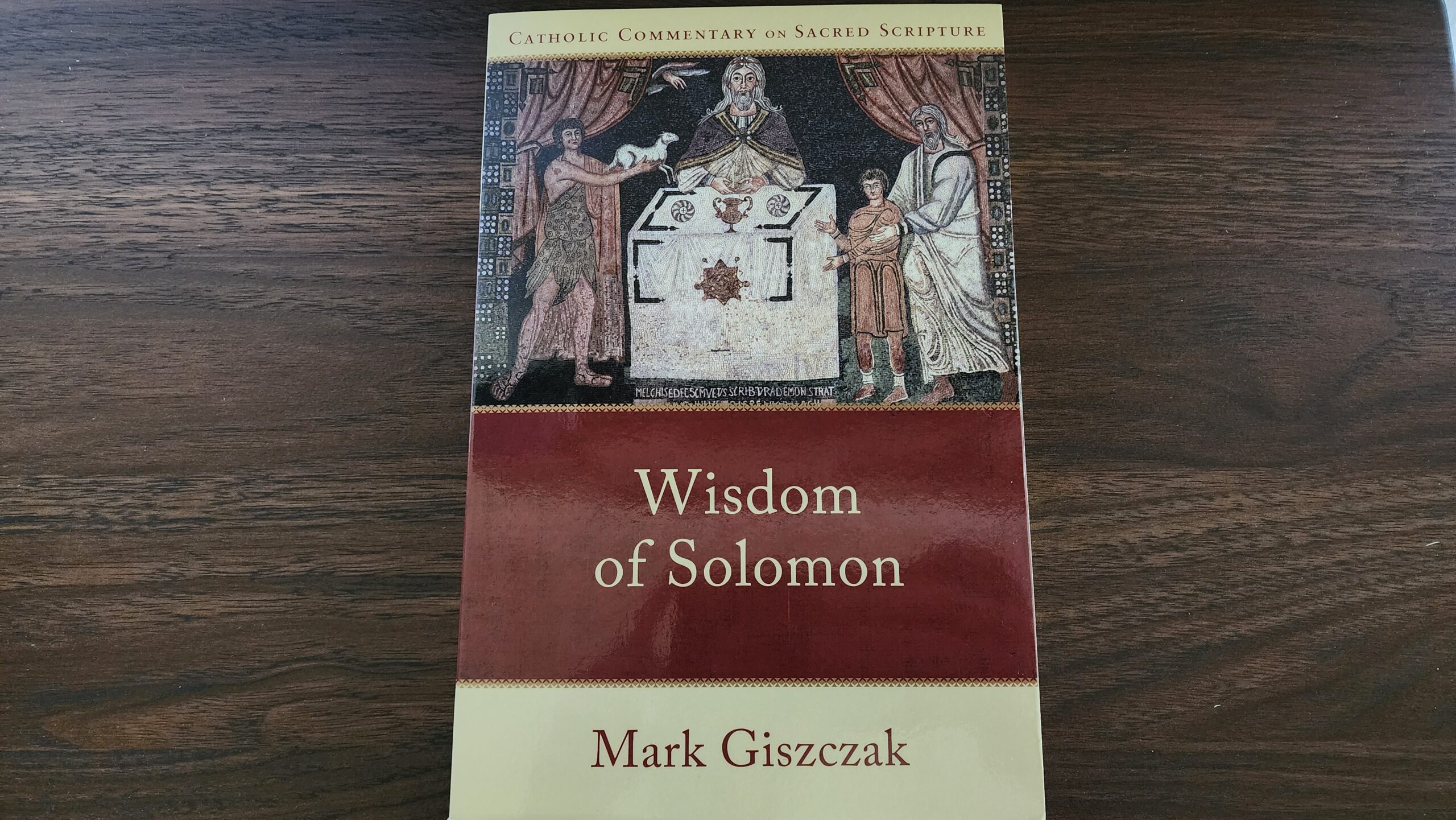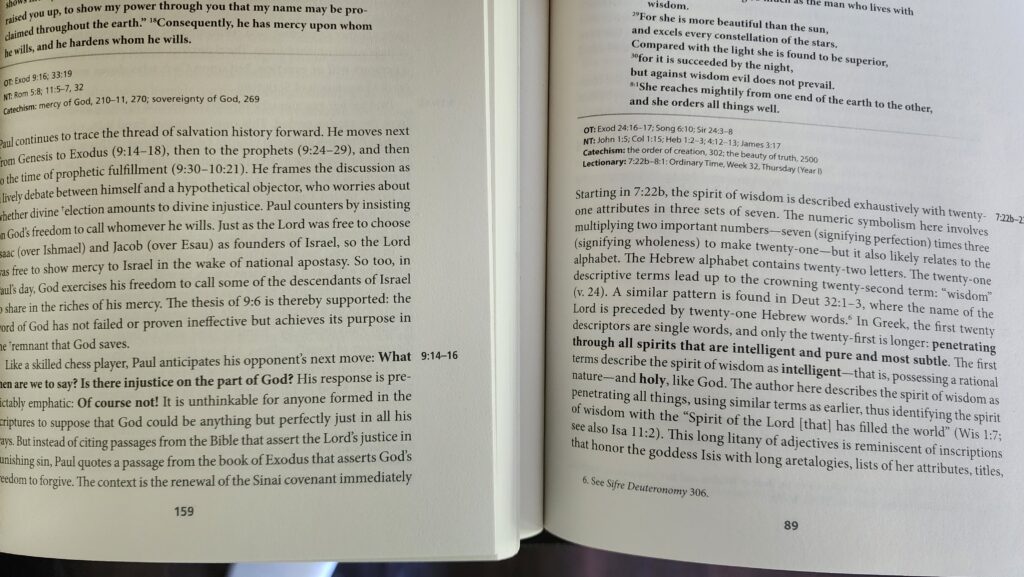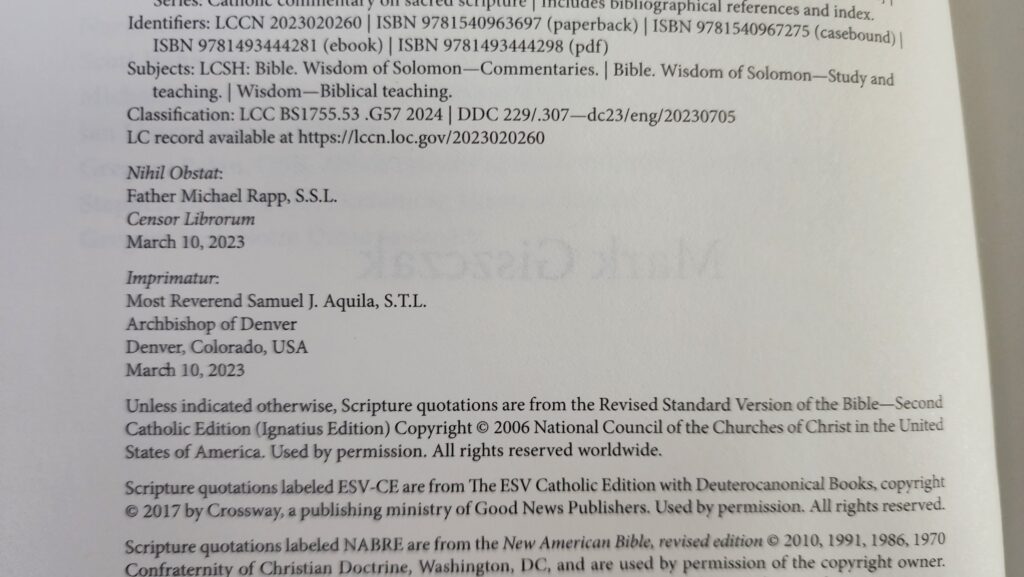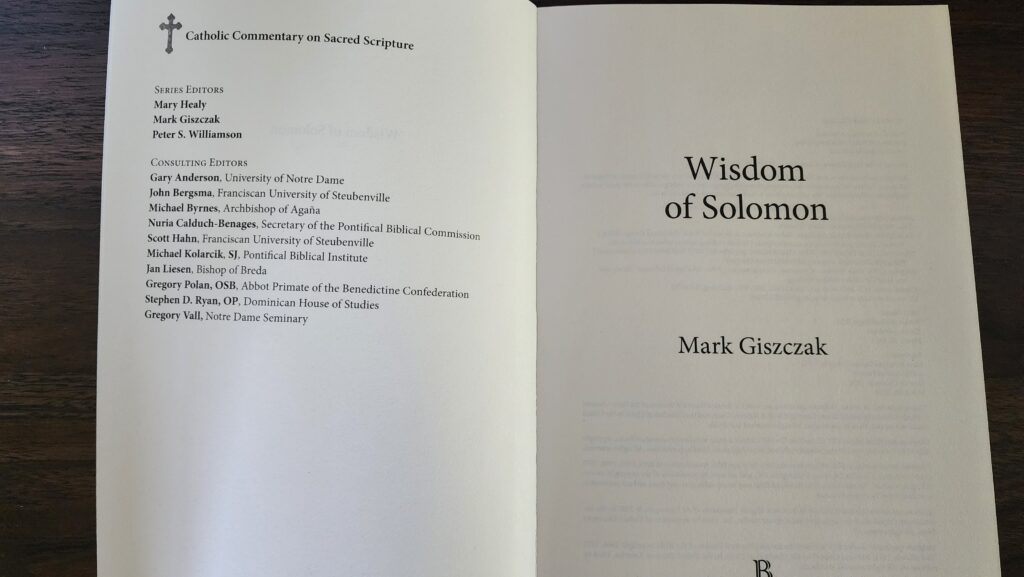
In February, Baker Academic published the first Old Testament volume in the Catholic Commentary on Sacred Scripture (CCSS) series—a commentary on the book of Wisdom by Dr. Mark Giszczak of the Augustine Institute. The commentaries on the New Testament were completed a few years ago, and I wrote some overview thoughts on the series in this post.
I recently finished reading Giszczak’s commentary on Wisdom, and I’ll give a brief overview of this first installment in the Old Testament in this review.
Translation, Layout, and Imprimatur
The overall format of the book follows the same pattern as the New Testament volumes in the CCSS series. The book begins with an introduction, outlining the historical context of the book of Wisdom and elucidating the themes of the book. Then, the commentary works its way through the entire book step-by-step. Several verses of the biblical text are printed in bold, followed by commentary that delves into the meaning of those verses. This pattern repeats until reaching the end of the book. Periodically, there are reflection and application sections with a few short paragraphs applying the themes of Wisdom to modern life.
One of the first things I noticed was the translation of the biblical text—the Revised Standard Version Second Catholic Edition (RSV-2CE). This marks a change from the New Testament volumes in the CCSS series, which print the NABRE text along with the commentary. I reached out to Dr. Giszczak to ask about this change. The USCCB’s announcement that the NABRE Old Testament will undergo further revision in preparation for the forthcoming liturgical bible played a role in the decision to use the RSV-2CE instead. The editors were reluctant to select a translation that could undergo substantial change during the course of work on the CCSS Old Testament series (which will likely take several years to complete).
Aside from the translation, the format of the commentary is quite similar to the New Testament volumes. The only significant difference is a denser page layout in the commentary on Wisdom compared to the New Testament volumes. As the following photo shows, the line spacing is noticeably smaller in the Wisdom commentary. This has not caused any problem for me in reading the text. The text is still very comfortable to read. The font size appears to be identical to the font in the New Testament volumes.

The commentary bears an imprimatur from Archbishop Samuel Aquila of Denver, in line with the standard set by all other volumes in the New Testament series (all of them bear at least a “printed with ecclesiastical permission” message from a bishop or religious superior).
Reflecting on the Reading Experience
I’ve enjoyed reading this commentary more than the New Testament volumes in the CCSS series. The New Testament volumes often break the biblical text into tiny segments of a few verses and comment at length on each segment. Giszczak’s commentary on Wisdom breaks the text into larger segments, and he frequently connects his comments to the broader themes of the book and the overall progression of Wisdom’s teaching and arguments. I found it easier to understand and appreciate the book as a whole after reading Giszczak’s commentary. By contrast, the New Testament volumes often leave me feeling like I’ve lost the big picture while focusing on details of individual verses and words.
For my own reading, I’ve come to see the New Testament volumes as primarily useful for verse-by-verse commentary and finding information on short passages rather than studying a biblical book in its entirety. For general reading and study, I prefer commentaries that work with larger segments of the text and illuminate the broader themes. Giszczak’s commentary on Wisdom is closer to that ideal than any of the New Testament volumes I’ve read in the CCSS series.
Conclusion
In summary, I enjoyed reading this volume and studying the book of Wisdom in depth. The commentary is more approachable as a fruitful study for an entire book than the New Testament volumes have been for me. I’m happy to see the first installment of the Old Testament in the CCSS series. As a final note, Dr. Giszczak has joined Dr. Mary Healy and Dr. Peter Williamson as a general editor for the Old Testament series, as listed in the front matter to the book:
The next volume to be released is a commentary on Ezekiel by Dr. Daniel A. Keating. Publication is expected in late August.


That looks fantastic. Totally makes sense for them to use another translation of the OT at this point. Good to see that the ESVCE is referenced.
Dr. Mark Giszczak was very involved in the publishing of the ESV-CE through the Augustine Institute, thus his making note of that edition in this commentary is sensical.
https://catholicbibletalk.com/2020/08/qa-on-the-esvce-w-mark-giszczak-s-s-l-ph-d/
I’ve seen on Amazon and B&N that a hardcover version of this exists, but I don’t see it advertised on the CCSS site, Christianbook, or the Baker sites. Anyone know if it’s legit? There’s one listed for the forthcoming Ezekiel one too.
I would be skeptical. The only hardcovers I’m aware of in the series are the four gospels. All the other volumes in the New Testament were paperback only.
So I ordered myself a copy and very much like it. Mark does a great job in the intro going over all the issues about location, authorship, date, etc… And I like that it references the RSV2Ce in conversation with the ESVCE and NABRE.
It did get me to think about the ESVCe and Augustine Institute (AI). While not knowing the extent to any contractual issues that Crossway may or may not have regarding the ESVCE and AI, reading through this commentary really had me wishing that they (AI) would focus on a commentary series to compliment their ESVCE instead of doing a whole new translation. I’m perfectly happy with my AI ESVCE as is. And if I want something with references, the Diadem is there too. But, at least for me, have a solid commentary series that includes the OT would be far more useful. Mark even mentions how few commentaries there are in Wisdom. Love that this edition is now available.
It is not an either/or, any good commentary cannot be too closely tied to any translation anyway.
The Catholic Commentary on Sacred Scripture series is excellent overall, and I know that a hard copy is the most useful for serious study. Still, I do not need 73 extra books in my already way too large Bible collection. That is why I collect these volumes in e-book format. Yes, e-books are very inconvenient for reference books, but buying, and trying to room in my house for, yet another bookcase to house all these volumes is even more problematic, not to mention expensive.